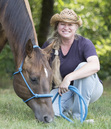Elena Hartwell's Blog, page 76
June 11, 2017
Barbara Bourland: Launching a Novel, Multiple Book Deals, and Terry Gross
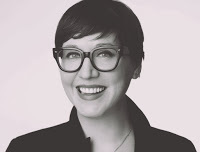 So happy to interview Barbara Bourland, ITW Debut Author for this week's blog. Barbara is the author of I'll Eat When I'm Dead, a murder mystery set at a fashion magazine. She is at work on Maniacs, its sequel, and her third novel, Pine City, is also forthcoming from Grand Central Publishing and riverrun. Find her @babsbourland on instagram and twitter. Click on her name to visit her website.
So happy to interview Barbara Bourland, ITW Debut Author for this week's blog. Barbara is the author of I'll Eat When I'm Dead, a murder mystery set at a fashion magazine. She is at work on Maniacs, its sequel, and her third novel, Pine City, is also forthcoming from Grand Central Publishing and riverrun. Find her @babsbourland on instagram and twitter. Click on her name to visit her website.
THE INTERVIEW
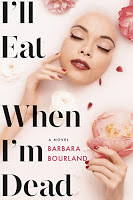 You went from being an unpublished author to having three books scheduled. I'll Eat When I'm Dead (launched May 2 from Grand Central & riverrun) its sequel—Maniacs—and Pine City, (a standalone from Grand Central & riverrun, launching in 2019). What was the process that got you to this awesome trio of books?
You went from being an unpublished author to having three books scheduled. I'll Eat When I'm Dead (launched May 2 from Grand Central & riverrun) its sequel—Maniacs—and Pine City, (a standalone from Grand Central & riverrun, launching in 2019). What was the process that got you to this awesome trio of books?Leaving Brooklyn and moving to Baltimore made all the difference. I'm easily distracted, and it's been a gift to experience a slower pace of life and discover how much I can get done every day. To be really productive, you don't need a standing desk, you don't need powdered meal replacements, you don't need a life coach: just stop doing things that don't matter. (This is something I need to be reminded about every couple of months!)
Between the two in your series and the stand alone, you go from characters in high stress careers in New York City to an artist at an abandoned resort in the Hudson Valley. How did you arrive at such different backdrops for your storytelling?
 I think those are two sides of the same coin. Creative work is more solitary than the business side, but it takes an enormous amount of pressure and discipline to produce something from nothing.
I think those are two sides of the same coin. Creative work is more solitary than the business side, but it takes an enormous amount of pressure and discipline to produce something from nothing. The protagonist of Pine City is incredibly driven, just like the women of I'll Eat When I'm Deadand Maniacs; it doesn't necessarily matter what their physical locations are, because they're all in the same mental place.
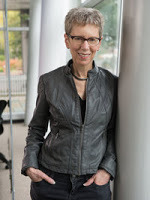 What would you like to be asked in an interview, but no one ever does?
What would you like to be asked in an interview, but no one ever does?"Can you hold for Terry Gross, please?" And we would talk about my book, but then! I would make the perfect joke and Terry would laugh, and laugh, and for the rest of the call we would be so busy becoming friends that the interview would be unusable.
(But wait, that's MY answer! We love you Terry Gross!)
How did your experiences writing for magazines inform your novel writing?It taught me to embrace the garbage can. I'm ruthless in draft. I feel little or no agony about moving on from prose or plotlines that aren't working, and I'm more efficient about working through a sentence or an idea that needs to be picked apart and/or rebuilt. Unless I think something is so funny that it can't be abandoned—I'm still precious about jokes, mainly because I think if you can make yourself laugh the one thousand times in a row that you read a joke while a novel is in process, then you're not delusional, it's probably hilarious.
Your first novel only launched a month ago, any surprises in these early days of being a published author?
It's really touching how many people have reached out to say they're loving the book. I didn't think I needed to hear that stuff—you have to really let go of a book when it comes out in the world—but of course it's lovely to hear from readers.
What are you working on now?
I'm working away on Maniacs, the sequel to I'll Eat When I'm Dead .
Final Words of Wisdom: Get off the internet.

(Except of course, for reading Elena's blog. Okay, Barbara didn't actually write that ... but I'm sure that's what she'd say!)
Thanks for visiting with us today, Barbara. See you in New York!
Published on June 11, 2017 00:00
June 4, 2017
Debut Author Shaun Harris Describes His Journey to Publication: Query Angry
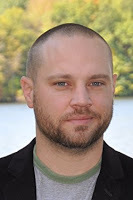 I'm very pleased to host ITW Debut Author, Shaun Harris as a guest blogger this week. Shaun Harris grew up the son of a homicide detective in Southern New England. He graduated from the University of Notre Dame with degrees in both American Studies and Film and Television.
I'm very pleased to host ITW Debut Author, Shaun Harris as a guest blogger this week. Shaun Harris grew up the son of a homicide detective in Southern New England. He graduated from the University of Notre Dame with degrees in both American Studies and Film and Television. As such he has a crippling obsession with Fighting Irish Football. He lives in Wisconsin with his wife, two kids, and a dog. Jim Rockford is his spirit guide. The Hemingway Thief is his first novel.
Query Angry
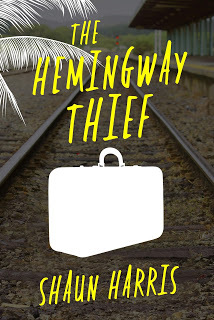 Last week Stephen Hunter posted an article on Buzzfeed and I can’t believe I just started this by referencing Buzzfeed. Regardless, stay with me. Mr. Hunter posited that in order to get published you have to write every day and if you don’t write every day then you should quit. There may have also been something in there about dedication to craft, effort, and stick-to-itiveness, but I can’t be certain because I only skimmed it. I’m sure there will be many think pieces in response to his article and I’m sure I will, at best, skim those as well. This article isn’t about that. It’s about filling a thousand words because I promised Elena I would and because, much like poor Desmond pressing the button in Lost, if I don’t write every day the world will end.
Last week Stephen Hunter posted an article on Buzzfeed and I can’t believe I just started this by referencing Buzzfeed. Regardless, stay with me. Mr. Hunter posited that in order to get published you have to write every day and if you don’t write every day then you should quit. There may have also been something in there about dedication to craft, effort, and stick-to-itiveness, but I can’t be certain because I only skimmed it. I’m sure there will be many think pieces in response to his article and I’m sure I will, at best, skim those as well. This article isn’t about that. It’s about filling a thousand words because I promised Elena I would and because, much like poor Desmond pressing the button in Lost, if I don’t write every day the world will end.Also it’s about Luck.
My first novel, The Hemingway Thief,came out last year. I wrote it in 2010. It took me four months to write and five years to sell. Most of the interim was spent looking for an agent. One of the unfortunate, yet unavoidable, parts of the publishing industry is the querying process. The tracking down and landing an agent part of the game is a completely different skill set than the one needed to write a novel. It’s like a baseball player trying to move on to cricket. I suppose, I don’t really know anything about cricket except for what Peter O’Toole explained in King Ralph. I recommend anyone trying to hone these skills, querying not cricket, to head on over to Janet Reid’s blog QueryShark . That’s where I learned how to write a query letter and everything else about agent hunting.
Now The Hemingway Thief is my first novel to be published, but it is not the first one that I wrote. That honor belongs to a bloated 100,000 plus word manuscript that I buried in the backyard and had a Voodoo priest say a couple of nice words over to make sure that it never came back. As terrible as it was, however, it gained the notice of an agent, who liked it and worked with me on it for a month, promising the whole time that when it was ready he would sign me. It was an exciting time to be alive in the Harris household. Then the agent’s boss died, which was not great, and the agent decided to leave the business, which was tragic. His parting words to me were to quit the business as books were dying as a medium. He suggested I go into the finance industry as he was doing. This was June of 2008, by the way. Yes, God loves me.
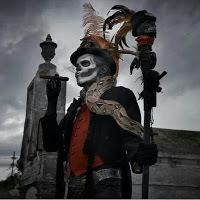 Instead of despairing, I mean, after I despaired for several weeks, I decided to write another book while still querying on the old one. I added it up a while ago and I think I sent out over seventy queries on that first book. I took a shotgun approach and by that I mean a sawed-off shotgun wielded by a blind man on cocaine approach. Eventually, I finished the Hemingway Thief, put the first manuscript aside (the Voodoo priest was called in at this point), and moved on to a new query letter. I sent it to some of the same people and some new ones. Learning my lesson from the last time I started a new novel almost immediately. My first child was also born around this time, but who keeps track of such distractions.
Instead of despairing, I mean, after I despaired for several weeks, I decided to write another book while still querying on the old one. I added it up a while ago and I think I sent out over seventy queries on that first book. I took a shotgun approach and by that I mean a sawed-off shotgun wielded by a blind man on cocaine approach. Eventually, I finished the Hemingway Thief, put the first manuscript aside (the Voodoo priest was called in at this point), and moved on to a new query letter. I sent it to some of the same people and some new ones. Learning my lesson from the last time I started a new novel almost immediately. My first child was also born around this time, but who keeps track of such distractions.I got a couple of bites and a few requests for the full manuscript for The Hemingway Thief, but once I finished the new book, a semi-sequel to Thief, I decided to move on once again. I started querying for the new book. At this point it had been about six years since I first started writing for realsies (realsies is an industry term meaning you open a Word file for the first time since college). It was looking more and more like I was going to be a professional stay-at-home Dad, which is awesome work if you can get it, and maybe I would write another book some day, but probably not. Then it happened. An agent called me, yes, called me, with an actual phone and everything. He loved the new book and wanted to sign me, but first he wanted to do a little editing.
Editing. If at some time in the Spring of 2014 you felt a gust of uncommonly bitter wind carrying along the faint whisper of a thousand curses, that was the sigh I let out at that moment.
But I went along and did the edits, and to be honest the book was better for them. The back and forth lasted about a month and at the end of the month this agent told me to wait by the phone. And he called just as he said he would. And he said he was no no longer interested.
It occurs to me, just now, that my hunt for an agent was eerily similar to my dating life in high school.
 So, frustrated, some would use the phrase “massively pissed off”, I did the thing that I always do when I get a rejection; I send out a bunch of queries. Ordinarily I would not suggest sending queries while angry. Mistakes can be made. In fact, mistakes were made and I sent the query for the new book along with the first five pages of The Hemingway Thief. I did not realize this until a couple of days later when I got a full request, but the agent couldn’t decide which book she wanted. Don’t try this at home kids. I’m a professional.
So, frustrated, some would use the phrase “massively pissed off”, I did the thing that I always do when I get a rejection; I send out a bunch of queries. Ordinarily I would not suggest sending queries while angry. Mistakes can be made. In fact, mistakes were made and I sent the query for the new book along with the first five pages of The Hemingway Thief. I did not realize this until a couple of days later when I got a full request, but the agent couldn’t decide which book she wanted. Don’t try this at home kids. I’m a professional. She signed me, but that’s not the punchline. I’m not sure there really is a punchline in this story. It’s more like a death slog of rejection and frustration, but hey, that’s what I signed up for. The coda then, we’ll call it a coda, is that this agent was not the agent that sold my book although she made a great effort until she too left the business. She was great and a wonderful guide for me. In the end she helped set me up with my current agent who is a bulldog and a good friend (though I have never actually met him, he may very well be a sentient telephone for all I know).
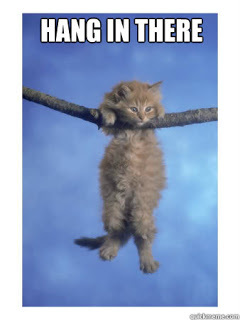 The point, if you’ve stayed with me this long, is that after eight years between typing the first line of a book and selling one there was a lot of ups and downs. I didn’t write every day. In fact, I didn’t write every week. I did stick with it though. The important thing is that I didn’t give up. I kept going. So there’s your bit of wisdom which I guess could have been summed up with a poster of a kitten hanging from a branch. Hang in there, kids.
The point, if you’ve stayed with me this long, is that after eight years between typing the first line of a book and selling one there was a lot of ups and downs. I didn’t write every day. In fact, I didn’t write every week. I did stick with it though. The important thing is that I didn’t give up. I kept going. So there’s your bit of wisdom which I guess could have been summed up with a poster of a kitten hanging from a branch. Hang in there, kids.Thanks for joining me this week, Shaun, and sharing your story! Looking forward to seeing you at ThrillerFest and celebrating your debut novel with the rest of the ITW Debut Authors!
Published on June 04, 2017 00:00
May 28, 2017
Debut Author Paul H. B. Shin Discusses Journalism, Fiction, and Martial Arts
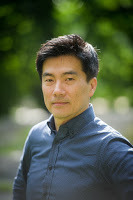 This week I'm thrilled to interview ITW Debut Author Paul H. B. Shin. Paul H.B. Shin’s debut novel follows a career as an award-winning journalist for more than 20 years, most recently for ABC News.
This week I'm thrilled to interview ITW Debut Author Paul H. B. Shin. Paul H.B. Shin’s debut novel follows a career as an award-winning journalist for more than 20 years, most recently for ABC News.
He was previously a reporter and editor for the New York Daily News. He was born in South Korea and lived in London during his childhood. He now lives in Brooklyn, New York.
THE INTERVIEW
You spent twenty years working as a reporter and editor before you published your first novel. How did those experiences impact your fiction writing?
As a reader, I enjoy pure fantasy stories as much as everyone else, but as a writer, I wanted to craft a novel grounded solidly in reality. So, the main way that my work as a journalist influenced my novel Half Life was that I took a very reportorial approach—intermingling real-life events and real-life characters with fictional ones. (I love this, Paul, I’m also a big fan of real-life aspects in fiction)
Also, because Half Life deals with North Korea, a subject that most Western readers aren’t that familiar with, I wanted to give them mileposts that they could recognize—not only to enhance the reality of the story, but also to make it relevant to their lives.
You were born in South Korea, grew up in London, and now live in Brooklyn. Half Life is about North Korea. What made you interested in writing a novel about that? Did your own history inform that decision? In what way?
The genesis of Half Life was a real life event that happened in New York City in 1997—an incident involving the North Korean ambassador to the United Nations that I eventually adapted and worked into the novel.
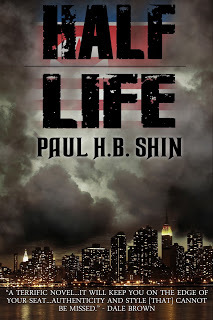
I was looking for a way into telling a story about North Korea in an authentic way. There’s that old adage to write what you know. So, I hit upon the idea that I could write something authentic if I based the story mostly in America, centered around a North Korean main character who was a diplomat based here.
One of the things that I’m proud of about “Half Life” is that I believe it’s a story that no one else could have written because of the way it straddles different cultures. I tried to incorporate my own personal history to inform that. (I think shaping a story using things we are invested in always brings more to our work)
After working so many years in the fast paced world of journalism, how has your writing routine changed? Tell us about your process of writing a novel.
The difference between writing for journalism vs. writing a novel is kind of like a left-brain, right-brain thing, but they do influence one another. For “Half Life,” I knew it would take a long time to write—both because of the research and because I had a full-time day job. So, I knew I would need a road map to keep me on track. That’s one reason I outlined the story quite thoroughly, marking out the major plot points and the emotional arcs that I needed the main characters to go through. Having that outline was invaluable. Many times when I began to lose momentum, I went back to the outline to reconnect with main thread of the story.
In terms of the actual process of writing, I tend to write in the morning before the day gets away from me, because I find that my mind is fatigued by the end of the day, and the last thing I want to do is sit at a keyboard again and struggle to hammer out something creative.(Me too! I’m not a morning person, but once I’m up, I’m definitely more creative before the day wears me out.)
What has been the biggest surprise for you, now that your first novel is on the shelves?
The biggest surprise for me was learning about the marketing and promotional aspects of the publishing industry. Because “Half Life” is my debut novel, I was woefully unaware of what’s involved in promoting the book. That’s been a steep learning curve, but at the same time, I’ve enjoyed delving into that process, and it’s given me a new appreciation for what it takes for an author to have both critical and commercial success.(Right! I think so many of us go through that. I sometimes wish I had a background in marketing.)
Tell us something about you that is not about your writing career—what are your hobbies or interests outside of writing.
I’m an avid practitioner of two related forms of Japanese martial arts called kendo and iaido (pronounced ee-eye-doh). They’re forms of fencing once practiced by the samurai. In fact, I’ve been the U.S. national champion in iaido three times. (Awesome! Congratulations)
I also used to do the occasional triathlon, but I was sidelined by a hip injury that required surgery. So, I’m gradually working my way back to fighting form, so to speak. I recently got back into running, and I realized how much I missed the Zen-ness of it. (Hope you are fully recovered soon.)
What are you working on now?
I’m working on a novel about a samurai who travels to Elizabethan England. So, it’s historical fiction. I guess you could say it’s partly related to my martial arts practice. I’m trying to bring a kind of journalistic rigor to the story as well, because there are a lot of misconceptions about both the Elizabethan period and the feudal era in Japan that are perpetuated in popular culture. So, I’m striving for something that’s historically authentic in addition to being a good story. (That sounds fascinating. When I’m teaching theater I like to remind students that the events in Shakespeare In Love could never really have happened…)
Final Words of Wisdom:
Writing is a craft, so to get better at it, you have to keep practicing it. But I think for new writers, that advice can be rather obvious and not that helpful. When you’re at the beginning of your writing career, you’re often dissatisfied with what you’re creating. But I once heard some advice from Ira Glass, the host and producer of the public radio program “This American Life,” that made me sit up and nod in agreement. He said that the fact that you’re not satisfied with the quality of your own work when you’re starting out is a good thing, because that means you have good taste. So, through practice, you narrow that gap between the quality of your own work and your good taste. Because one could argue that good taste is harder to learn than good writing.
I would also add that it’s important if you want to make a living as a writer not to wait for inspiration to strike you. That’s a luxury that you can’t afford. It’s really important to just plug away at it. Some days the words will flow easily and some days it’s pure torture. But I think I’ve created some of my best work by battling through some of those deep valleys. (Great advice. Thanks for joining us this week!)
Published on May 28, 2017 08:33
May 21, 2017
Hollie Overton: From Television Writer to Novelist
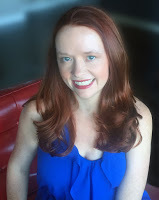 I'm thrilled to have Hollie Overton as my guest blogger this week. In addition to being a member of the ITW Debut Author class, Hollie Overton is a TV writer and producer. She has written for Shadowhunters, Cold Case, and The Client List, Hollie's debut thriller, BABY DOLL is an international bestseller and was published in eleven countries. Her 2nd novel, THE WALLS will be released Aug. 2017. An identical twin, Hollie grew up in Kingsville, Texas but now resides in LA with her husband and rescue dog.
I'm thrilled to have Hollie Overton as my guest blogger this week. In addition to being a member of the ITW Debut Author class, Hollie Overton is a TV writer and producer. She has written for Shadowhunters, Cold Case, and The Client List, Hollie's debut thriller, BABY DOLL is an international bestseller and was published in eleven countries. Her 2nd novel, THE WALLS will be released Aug. 2017. An identical twin, Hollie grew up in Kingsville, Texas but now resides in LA with her husband and rescue dog.
For more information about Hollie, you can visit her on social media. Click on the links below:Facebook Twitter
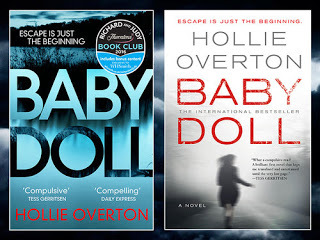
THE BLOG POST
For as long as I can remember, I’ve been obsessed with telling stories. From my elementary school days, scribbling in my floral colored journals to my teen years spent writing terrible poetry and experimental fiction, writing became my therapy. But my dream was to become an actress. I moved to New York City to study acting but kept writing, too insecure to show anything. It wasn’t until I moved to LA that I began to try my hand at screenwriting and found the courage to put my work out there. I wrote several terrible scripts before one landed me a coveted spot in the Warner Brothers TV writing workshop. Since then I’ve worked on Cold Case, The Client List and Shadowhunters.
It was during an extended period of unemployment (an unfortunate side effect of pursuing a career in showbiz) that I began to consider writing fiction. Reading was always a passion. From an early age, I’d devour three or four books a week, but writing a novel seemed daunting. How could I possibly compete with the greats? I guess that’s why when I originally started writing prose, I didn’t set out to write a novel. I had an idea and a character and I just kept writing. Before I knew it, I had written ninety pages of my debut novel, BABY DOLL. Since then I’ve completed my second novel, THE WALLS which will be published later this summer. Of course writing a novel requires a different process and set of muscles. It wasn’t always easy translating my skills from TV to fiction but I learned four important lessons along the way.
THE HEART OF THE STORYOne of the major similarities with writing screenplays versus novels is that character is everything. In order to connect with a reader or a viewer, you must create unique and interesting characters. As the story unfolds, each character must have specific wants and desires and be in constant pursuit of a goal. I want the reader or viewer to connect with the characters, to find themselves swept away. It’s what I strive for in everything I write.
FILLING IN THE BLANKSOne of the pivotal differences with writing TV versus novels is that in television, scripts are blueprints. They’re unfinished until they go through the process of production and editing. You need actors, directors, costume designers, and editors to bring a TV show to life. But in fiction, you are all of those things rolled rolled into one. It’s your job to create the world, the look, the characters and evoke those same feelings with nothing but words on a page. While I was writing Baby Doll, I took a fiction workshop with Eduardo Santiago, a novelist and creating writing instructor. He was crucial in developing my writing process. In an early draft, I wrote that a character was devastated. Eduardo reminded me I wouldn’t have an actor showing the reader what devastated looked like. It was my job to really explore what devastated looks like. What was character’s facial expression? Their body language? The setting where the character experienced that emotion. Now when I write fiction, I’m constantly asking myself is this a place where I need to dig deeper and paint the picture more clearly.
BUILDING A FOUNDATION When I began writing TV, the mantra from every teacher and mentor I had was outline, outline, outline. In TV and film, you have a limited page count, so knowing exactly where you’re going and how you plan to tell your story is critical. I can’t imagine writing a script without a blueprint. But because I started writing my first novel without an outline, that’s what feels natural. There are times when I end up having to cut things or rework the novel because it needed to move faster or make cuts because a certain character’s storyline was weighing down the book but I like being surprised when I’m writing fiction. In some ways, it’s much more freeing than when I’m writing TV.
THE FINISHED PRODUCTAs a TV writer on a staff, your job is to assist the showrunner in bringing their vision to life. Unless you’re the creator, you’re not in control of the finished product. When you’re writing a novel, it’s the exact opposite. A book is your baby from start to finish, for better or worse. There’s pressure that comes with being solely responsible but there’s also a huge sense of pride that comes with completing a book, that joyful moment when you type THE END.
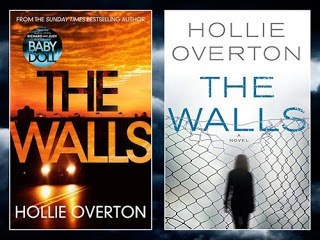
Published on May 21, 2017 09:15
May 13, 2017
Debut Novelist Micki Browning Chats about Law Enforcement, Diving, and Conflict Resolution
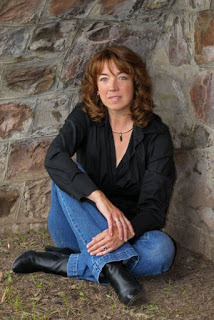 This week, I'm thrilled to interview ITW Debut Author Micki Browning.
This week, I'm thrilled to interview ITW Debut Author Micki Browning. An FBI National Academy graduate, Micki Browning worked in municipal law enforcement for more than two decades and retired as a division commander – wonderful fodder for her current career as a full-time writer.
Her mystery, Adrift, set in the Florida Keys, won the 2015 Daphne du Maurier Award for Excellence and the Royal Palm Literary Award for best unpublished mystery and unpublished book of the year. It was published January 2017 by Alibi-Random House.
Micki resides in Southern Florida with her partner in crime and a vast array of scuba equipment. She’s currently working on Beached, the second in the Mer Cavallo Mysteries.
To learn more about Micki - visit her on social media.
The Website
THE INTERVIEW
Since retiring from the police force, you’ve earned your professional divemaster rating and diving plays a huge role in your first novel Adrift. Tell us about an exciting dive experience.
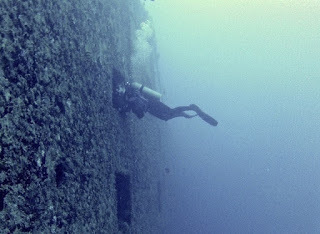 I find every dive exciting. I’ve had the pleasure of diving with giant Manta rays in Hawaii, Goliath groupers in the Keys, and exotic reef fishes and sharks in the Caribbean. I’ve dived in caves, caverns, and kelp. I’ve even been diving with Mickey Mouse at Epcot. Of all my experiences, I have to say I enjoy exploring wrecks the most. Swimming along the bones of sunken vessels spurs my imagination into high gear as I imagine the stories left behind. (The photo shows Micki about to enter the USS Spiegel Grove, the ship in Adrift).
I find every dive exciting. I’ve had the pleasure of diving with giant Manta rays in Hawaii, Goliath groupers in the Keys, and exotic reef fishes and sharks in the Caribbean. I’ve dived in caves, caverns, and kelp. I’ve even been diving with Mickey Mouse at Epcot. Of all my experiences, I have to say I enjoy exploring wrecks the most. Swimming along the bones of sunken vessels spurs my imagination into high gear as I imagine the stories left behind. (The photo shows Micki about to enter the USS Spiegel Grove, the ship in Adrift).Your background in law enforcement makes you very well suited for understanding both crime investigation and insights into criminal behavior. We often hear about how authors relate to the good guys in their novels - how do you relate to the bad guys? Are they based on real people or incidents?
My background certainly informs my writing. I’ve learned that not all criminals are bad people and not all victims are angels. Life is messy. Complicated. A cop’s most crucial skill is communication, the ability to build rapport. I’ve discussed Chaucer with an arrestee on the way to jail, and learned how to juggle from a traumatized seven-year-old. Everyone wants to be heard. Listen long enough and everyone can find common ground. The people I’ve met in life are inspirational, but their stories are theirs to tell. I write fiction. It’s the humanity I try to get right. (By the way, Micki, I'm stealing this line).
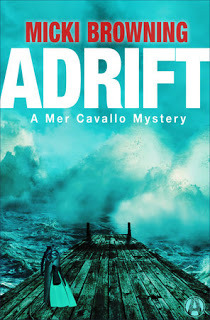 You've lived on both coasts, Santa Barbara to the west and the Florida Keys to the east. You've also lived high in the mountains in Durango, Colorado. How much are you impacted by environment as a writer? Place takes a central role in Adrift, can we anticipate Mer Cavallo traveling outside the Keys? Or future books or series taking place in the mountains?
You've lived on both coasts, Santa Barbara to the west and the Florida Keys to the east. You've also lived high in the mountains in Durango, Colorado. How much are you impacted by environment as a writer? Place takes a central role in Adrift, can we anticipate Mer Cavallo traveling outside the Keys? Or future books or series taking place in the mountains? I find setting to be as integral to the story as character. I want to experience what the character is experiencing. Is it humid or icy? Does she hear a raptor or a seagull? What does he see that makes an impression? What childhood memories are evoked by the location’s scents? I love when non-divers tell me how much they enjoyed my underwater scenes. They’ve never worn a tank but I’ve introduced them to diving. Mer will never be landlocked, but considering seventy percent of the earth is covered by water there are many places she can explore—above and below the surface.
As to future books? Mer’s next adventure is all wrapped up and I’m currently working on a story that takes place in the mountains during the dead of winter. The mood is very different. (To see more photos of the Florida Keys and locations used in Adrift, visit Micki's blog by clicking HERE)
As a police officer, you've done a lot of conflict resolution, everything from pulling someone over for a traffic violation and needing them to agree with your request for their license to working as a crisis negotiator. Tell us about a situation where you expected a violent reaction, but you were able to talk someone down.
One busy weekend night, I was dispatched solo to a man suspected of being high on PCP and creating a disturbance. This is not a good call to have to go to on your own, as a person on PCP is impervious to pain and highly excitable. When I approached, I saw he was seated on a bus bench, rocking back and forth, his hands fisting and unclenching. And he was BIG.
I lowered my voice and introduced myself. “It looks like you want to hurt someone.”He rocked faster. “Yeah. I do.”Great. “Do you want to hurt me?”“I don’t want to, I might though, yeah.” Wonderful. I began second-guessing my career choice. “Would it make you feel better if I handcuffed you?”His rocking stopped. I steeled myself.“Yeah.” He turned around and put his hands behind his back.
Moral of the story? Know how to speed-cuff and always be prepared to offer alternatives to the obvious.
What made you decide to create an amateur investigator rather than either a police detective or a private investigator with a police background?
I enjoyed being a police officer, but after 22 years, I wanted to focus on something else. My husband and I relocated to the Keys so we could dive and figure out what we wanted to do next. Enter a bit of serendipity. He became a scuba instructor, and I became a divemaster with a writing itch. My favorite wreck dive is the USS Spiegel Grove in Key Largo. A documentary crew was filming a night dive on the ship when one of their divers suffered a medical emergency at depth. Happily, the diver recovered, but the event sparked a whole bevy of what ifs that eventually became my novel, Adrift.
What are you working on now?
I’m writing a police procedural. It’s time to put all that training and experience into action.
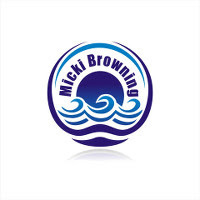
Final words of wisdom:
The best bit of writing advice ever given to me was simple: plot from the point of view of the antagonist and write from the perspective of the protagonist. A character can’t solve a crime if the author doesn’t know how it was committed.
Published on May 13, 2017 00:00
May 7, 2017
Author Walt Gragg on the Cold War, Military Life, and Launching his First Novel.
I'm very happy to have ITW Debut Author Walt Gragg join me for this week's author interview. Walt has a remarkable background, priming him to write a complex military and political thriller, right out of the box.
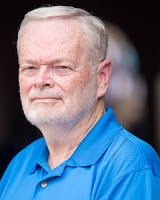 Walt Gragg lives in the Austin, Texas area with his wife, children, and grandchildren. He has been one of the truly fortunate individuals who have had the opportunity to live in many places around the world including Europe, Asia, and in every time zone within the United States. Born in Los Angeles, he has spent his life experiencing some of the world’s largest cities and smallest towns.
Walt Gragg lives in the Austin, Texas area with his wife, children, and grandchildren. He has been one of the truly fortunate individuals who have had the opportunity to live in many places around the world including Europe, Asia, and in every time zone within the United States. Born in Los Angeles, he has spent his life experiencing some of the world’s largest cities and smallest towns.
He is a retired attorney and former Texas State Prosecutor. He has a Bachelor’s Degree Summa cum Laude from the University of Maryland, Master’s Degree from Pepperdine University, and Juris Doctorate from the University of Texas. The Red Line is his first novel.You can find out more about Walt on social media:Twitter Facebook(Author) Facebook(Personal) Facebook(The novel)
What prompted you to write a novel about World War Three?(and how scared should I be given how much you know about these things?)
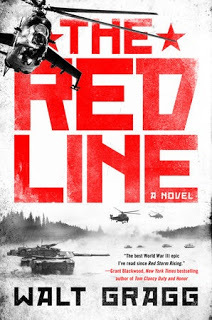 In the middle of the first Cold War, I served at United States European Command Headquarters in Germany. While there I was able to observe a great deal of the American plan for the defense of Europe and experience through multiple war games how we viewed such a war would unfold. I knew our weaknesses, concerns, fears, and what we anticipated the Russians would do. From those elements, the story just appeared. At that moment, however, I had neither the time, nor the ability to write it. So I filed it away in some small corner of my mind and went on with my life. I carried the idea for The Red Line around for nearly twenty years.
In the middle of the first Cold War, I served at United States European Command Headquarters in Germany. While there I was able to observe a great deal of the American plan for the defense of Europe and experience through multiple war games how we viewed such a war would unfold. I knew our weaknesses, concerns, fears, and what we anticipated the Russians would do. From those elements, the story just appeared. At that moment, however, I had neither the time, nor the ability to write it. So I filed it away in some small corner of my mind and went on with my life. I carried the idea for The Red Line around for nearly twenty years.
What seemed to trigger the need to finally present it was the casual attitude toward war that has been developing in this country for the past 25 years. War is being celebrated and glorified by far too many. We are at a point where many Americans actually view war in a positive light. Our citizenry has grown detached and almost enthusiastic in their view of the horrors of such occurrences. That, most certainly, hadn't always been the case. Just a couple of decades earlier, during the Vietnam War, everyone knew someone in the military. We all had a neighbor, classmate, or relative involved in the fighting. And that heightened our understanding of the cruel truths of these hideous events. As the years pass that has changed.
In the present day, few of us know anyone in the military. Such a circumstance has greatly increased the average person's tolerance for these nightmarish developments. War has quickly become little more than a video game or macabre form of home entertainment. My hope, more than anything, is that The Red Line is able to change at least a few of those perspectives. If we insist upon blindly reveling in the senseless slaughter of others, the result will be something none of us will want to see. If we continue to view war as a first response, rather than a last resort, we will all suffer in the end. (What a great sentiment, Walt, I hope your book succeeds at changing a few perspectives.)
To answer the second part of your question, I don't know if terrified is the correct word at this moment in history, but we should all be concerned. Americans need to understand from where Putin and his people are coming. World War II ended over 70 years ago, but for Russia the festering wounds from that ghastly conflict remain fresh. Over 20 million Russians died at the hands of a ruthless invader from the West bent on conquest. During the First Cold War the Russians had the security of the buffer provided by the countries of Eastern Europe to protect them from the West's immense power. They, however, lost such security at the peaceful end of that decades-long test of wills. NATO now hovers on their doorstep.
There is little doubt they would like to change that by reconstituting something like the Soviet Union and Warsaw Pact. There are certainly signs of a Second Cold War emerging. Putin desperately wants to return his country to its rightful place on the world stage. To do so, he is strengthening both his conventional weapons and nuclear arsenal. This year alone, Russia is building 700 new tanks and armored vehicles and 170 additional military aircraft. Russia's seizure of the Crimea was just the first act in an ongoing play. It will continue. We survived 45 years of a First Cold War, but there is no guarantee we will survive a second one.
Although the threat of thermonuclear war had been relatively dormant since the early 1990's the capacity for such an event has always been present. Everyone needs to understand we have developed weapons so powerful and frightening that should the unthinkable happen all of mankind could be destroyed in a few swift minutes. More than ever, if we wish our children and grand-children to have long, happy lives, we need to find the wisdom to prevent such a world-ending holocaust from occurring. (Great insight into aspects of recent history many of us don’t know)
You first started thinking about the story for The Red Line during your time in the military, what was the journey of this story to finally coming out in print?
Unlike so many of my follow authors who were compelled to write from an early age and typically pursue that career in college through an MFA degree, I only began writing because I felt I had a story to tell. My journey, like so many writers, was long and painful. I actually began developing The Red Line in 1994. Because I hadn't grown up planning and preparing to be a writer, I struggled for a few years to actually figure this stuff out. It took about a year to put the story on paper but the quality of the writing wasn't yet there. So we kept working on it.
By 1997, I had developed my writing skills enough to begin presenting the work. I entered the manuscript in a writing contest and ended up taking second place. One of those at the conference was an editor from a major publishing house. After reading the first chapter he requested the entire thing. A few months later the phone rang with the editor on the other end of the line. His enthusiasm was over the top. The book was "incredible" and I was a "remarkable talent." Eight days later he called again to tell me his publisher had rejected it. The story was just too controversial. I began attending more conferences and sending out endless queries. Yet nothing worked. No one gave it a second look.
I wrote another novel with no luck. After a few years of continual rejection I reluctantly put both manuscripts on a shelf where they gathered dust for about ten years. I promised my wife that once we retired we would try again, but honestly didn't know if I could go through all of that again. In 2014, it was time to try once more. In the process of giving it one final attempt I stumbled across the ThrillerFest website and immediately knew this was a conference I had to attend.

Thoroughly prepared to pitch my book, we headed for New York. PitchFest went reasonably well, with a number of requests for the manuscript. Little did I know, however, it would be the next day that would change everything. To my surprise, the editor who had loved the book was on a panel. I went up afterwards and reintroduced myself. Of course, after 17 years he didn't remember me or the book. But that was okay. I thanked him for the kind words years earlier and left. The next morning, quite by accident, we ended up having breakfast together. A couple of weeks later he indicated he was willing to look at the story again.
So I contacted the agent I'd liked the best at PitchFest. She got her readers right on it, and by the end of the day I had an agent. We gave the editor an exclusive and he didn't disappoint. Just fifteen weeks after ThrillerFest, Penguin Random House acquired the book and we were on our way. (WOW – talk about overnight success just taking twenty years….)
How did being in the military and being a Texas State Prosecutor impact you as a writer? How did those two careers compare and contrast in terms of your worldview?
While in the military, I got the opportunity to live in both Asia and Europe for over three years. I've viewed the Third World firsthand. I've experienced other cultures. Like most soldiers, I've seen things most people cannot even imagine. They say our experiences are what make us as writers. And I've been fortunate to experience many things.
What attending law school and being an attorney did was to structure and refine my writing abilities. While writing legal briefs and appeals is certainly different than the type of writing I do now, it was quite useful in developing how to put together an effective story. Every trial attorney will tell you a huge element of any case is creating a narrative, a story, that simplifies and explains the actions occurring in real life.
A soldier, like myself, gets many opportunities to examine a wide world. Lawyers seldom have such a chance. For the most part, their world is limited to the case in front of them. Yet, both lives helped further my ability to write The Red Line.
Your work is being applauded for its complexity - both a political and military thriller, but also as a work with tremendous literary skill. How do you feel you achieved such a remarkable feat in a first novel? Any advice for new authors?
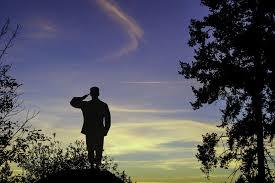 Honestly, I'm not sure. I simply worked as diligently as possible to write the best story I was capable of writing while refusing to settle for anything less. My goal in the story was to be able to present an entire war in a single novel. That alone necessitated complexity. I needed to provide a big picture political/military view of how such a conflict would likely unfolded. That created the need for the development of a political backdrop and the involvement of high level characters and roles - president, dictators, generals, and so on. But I wanted to do much more.
Honestly, I'm not sure. I simply worked as diligently as possible to write the best story I was capable of writing while refusing to settle for anything less. My goal in the story was to be able to present an entire war in a single novel. That alone necessitated complexity. I needed to provide a big picture political/military view of how such a conflict would likely unfolded. That created the need for the development of a political backdrop and the involvement of high level characters and roles - president, dictators, generals, and so on. But I wanted to do much more.
The best stories relating to war, Saving Private Ryan, for example, were about average soldiers involved in a desperate fight. My intent was to tell the majority of the tale through the eyes of ordinary men and women facing extraordinary circumstances. In putting such a story together it became apparent no one soldier would have the ability to see the entire war. Their vantage points naturally would be limited. So I ended up actually writing five different, intertwining stories occurring at the same time.
Making that work wasn't easy but it did have one advantage for a beginning writer - whenever I bogged down in one story, I could simply move on and write portions of another. So there was never any writers block. I don't view writing as a linear process. I see it as more like putting together a huge jigsaw puzzle with many pieces. It is not unusual for me to write chapter 17 before chapter 13, or the middle or end of a chapter before the beginning. I'm not certain I demonstrated great literary skill, but it's nice that a number of reviewers have said so. My approach was to just keep writing and rewriting until the words jumped off the page. Hopefully, that will be enough.
Advice for new authors - first, understand that there are two parts to this job...Writing your novel and finding someone willing to publish it. For most writers the first part is by far the easiest. Once you've created a great product, you need to put just as much effort into finding it a home as you did into writing it. Lots of writers, even exceptionally talented ones, fail at the second part of the job. Next, write about things you know. Write about things you are passionate about. There's nothing wrong with putting your heart and soul into your writing. In fact, there's a great deal right in doing so.
Don't fall into the trap of attempting to write what's "hot." Even in the best of circumstances the process is a slow one as you work your way through writing, finding an agent and editor, and completing all the edits and production work to get it ready for the bookstores. With rare exception, this takes years. By the time all of that occurs your "hot" novel is long past. Focus more on creating compelling characters and a great story rather than getting enticed by the latest craze. Try to be the first "you" in your writing, rather than the tenth someone else. In creating your story, make sure you entertain. The reader needs to enjoy the story before all else and you have no right to expect them to read it if it doesn't do so. Depending on the type of story, it's often okay to just entertain.
Unfortunately, far too many books in the present market do just that and nothing more even where a true opportunity exists. We all enjoy a nice "summer read" from time-to-time, but if that's all the book world is providing, reading soon gets old. I like to learn from my reading and believe most readers do also. There is nothing wrong with actually having something important to say that will cause readers to pause and reflect. Go ahead and say it.
I'm giving you two options here - because you may not feel the first is something you want to respond to, so either A or B is fine. A. (Luckily for us, Walt was willing to answer both!)
Given current events, do you feel as if your fictional future war is becoming more or less likely to occur in the real world?
Far more likely to occur. While I certainly don't want to spend a great deal of time commenting on where our policies stand today, our present administration seems relentless in their quest to engage in war with someone. From all appearances we have a President with a fanatical craving for popularity who believes one of the best ways to achieve that is by starting a conflict with the potential to take many brave lives.
Until the American people find a way to ensure he understands that with a few exceptions any President willing to blindly take us into war is almost always demonstrating an abject failure of leadership, we are in a great deal of trouble.
We often hear how hard authors, especially debuts, have to work on self-promotion. What are your plans to support the launch of your novel? Any surprises as you begin the business side of being an author?
We've worked extremely hard for months to try to get the book in front of people. Ultimately, nothing else matters if people don't read your story. Along with our Penguin Random House publicists, we also went out and hired private publicists to further promote the work. Both are doing a great job. We have had a number of major reviews, the vast majority of which were incredible. Publishers Weekly gave The Red Line a highly coveted "boxed" "starred" review which they award to approximately one out of a hundred books they look at. They liked the book so much they did a followup interview with me in March, a rare event for any debut author.
We have optioned the movie/television rights to producers in Hollywood who are turning the story into an 11-episode television event. We just completed what we believe is the greatest launch party in the history of Austin. Over 500 personal invitations were sent. Three excellent guest authors participated. Free food and drinks, and music from one of the best Beatles cover band around. We are presently involved in a fairly aggressive book signing tour along with stock signings wherever bookstores are interested.
I am doing around 20 radio interviews, at least two of which are national. As a debut, you're an unknown and need to accomplish three things to be successful. First getting potential readers to hear about the book. Second, getting them to consider the book. And, third getting them to buy it. How successful we'll be at completing those three steps is yet to be determined. (Okay – I’m exhausted just thinking about all this… What a great launch for your first novel.)
What hasn't been a surprise in learning the business side of being an author? Every day is a new day. Like every profession, publishing has its own language, rules, and protocols. Things that are now simple for fellow writers, agents, editors, and publicists are all brand new to you. Your responsibility as the debut is just like a new worker in any job. Listen and learn. I've made plenty of mistakes along the way, but am doing my best to not make the same one twice. Hopefully, that will be enough. (Great advice)
What are you working on now?
When I can find the time to work around a busy release schedule I'm working on my third novel, The Long November, which is about what could happen if the Pakistani government and military collapsed and a fanatical terrorist group seized that country's huge nuclear arsenal. My second novel, The Chosen One, is presently under consideration by my publisher. Final Words of Wisdom:
Final Words of Wisdom:
At ThrillerFest, as I prepare the 300-400 aspiring writers to participate in PitchFest, I always tell them something that outstanding writer and ITW board member, Sandra Brannan, told me. Getting published is a marathon not a sprint. It's those writers when understand that and stay in the race who have a chance of making it in this business.
 Walt Gragg lives in the Austin, Texas area with his wife, children, and grandchildren. He has been one of the truly fortunate individuals who have had the opportunity to live in many places around the world including Europe, Asia, and in every time zone within the United States. Born in Los Angeles, he has spent his life experiencing some of the world’s largest cities and smallest towns.
Walt Gragg lives in the Austin, Texas area with his wife, children, and grandchildren. He has been one of the truly fortunate individuals who have had the opportunity to live in many places around the world including Europe, Asia, and in every time zone within the United States. Born in Los Angeles, he has spent his life experiencing some of the world’s largest cities and smallest towns.
He is a retired attorney and former Texas State Prosecutor. He has a Bachelor’s Degree Summa cum Laude from the University of Maryland, Master’s Degree from Pepperdine University, and Juris Doctorate from the University of Texas. The Red Line is his first novel.You can find out more about Walt on social media:Twitter Facebook(Author) Facebook(Personal) Facebook(The novel)
What prompted you to write a novel about World War Three?(and how scared should I be given how much you know about these things?)
 In the middle of the first Cold War, I served at United States European Command Headquarters in Germany. While there I was able to observe a great deal of the American plan for the defense of Europe and experience through multiple war games how we viewed such a war would unfold. I knew our weaknesses, concerns, fears, and what we anticipated the Russians would do. From those elements, the story just appeared. At that moment, however, I had neither the time, nor the ability to write it. So I filed it away in some small corner of my mind and went on with my life. I carried the idea for The Red Line around for nearly twenty years.
In the middle of the first Cold War, I served at United States European Command Headquarters in Germany. While there I was able to observe a great deal of the American plan for the defense of Europe and experience through multiple war games how we viewed such a war would unfold. I knew our weaknesses, concerns, fears, and what we anticipated the Russians would do. From those elements, the story just appeared. At that moment, however, I had neither the time, nor the ability to write it. So I filed it away in some small corner of my mind and went on with my life. I carried the idea for The Red Line around for nearly twenty years. What seemed to trigger the need to finally present it was the casual attitude toward war that has been developing in this country for the past 25 years. War is being celebrated and glorified by far too many. We are at a point where many Americans actually view war in a positive light. Our citizenry has grown detached and almost enthusiastic in their view of the horrors of such occurrences. That, most certainly, hadn't always been the case. Just a couple of decades earlier, during the Vietnam War, everyone knew someone in the military. We all had a neighbor, classmate, or relative involved in the fighting. And that heightened our understanding of the cruel truths of these hideous events. As the years pass that has changed.
In the present day, few of us know anyone in the military. Such a circumstance has greatly increased the average person's tolerance for these nightmarish developments. War has quickly become little more than a video game or macabre form of home entertainment. My hope, more than anything, is that The Red Line is able to change at least a few of those perspectives. If we insist upon blindly reveling in the senseless slaughter of others, the result will be something none of us will want to see. If we continue to view war as a first response, rather than a last resort, we will all suffer in the end. (What a great sentiment, Walt, I hope your book succeeds at changing a few perspectives.)
To answer the second part of your question, I don't know if terrified is the correct word at this moment in history, but we should all be concerned. Americans need to understand from where Putin and his people are coming. World War II ended over 70 years ago, but for Russia the festering wounds from that ghastly conflict remain fresh. Over 20 million Russians died at the hands of a ruthless invader from the West bent on conquest. During the First Cold War the Russians had the security of the buffer provided by the countries of Eastern Europe to protect them from the West's immense power. They, however, lost such security at the peaceful end of that decades-long test of wills. NATO now hovers on their doorstep.
There is little doubt they would like to change that by reconstituting something like the Soviet Union and Warsaw Pact. There are certainly signs of a Second Cold War emerging. Putin desperately wants to return his country to its rightful place on the world stage. To do so, he is strengthening both his conventional weapons and nuclear arsenal. This year alone, Russia is building 700 new tanks and armored vehicles and 170 additional military aircraft. Russia's seizure of the Crimea was just the first act in an ongoing play. It will continue. We survived 45 years of a First Cold War, but there is no guarantee we will survive a second one.
Although the threat of thermonuclear war had been relatively dormant since the early 1990's the capacity for such an event has always been present. Everyone needs to understand we have developed weapons so powerful and frightening that should the unthinkable happen all of mankind could be destroyed in a few swift minutes. More than ever, if we wish our children and grand-children to have long, happy lives, we need to find the wisdom to prevent such a world-ending holocaust from occurring. (Great insight into aspects of recent history many of us don’t know)
You first started thinking about the story for The Red Line during your time in the military, what was the journey of this story to finally coming out in print?
Unlike so many of my follow authors who were compelled to write from an early age and typically pursue that career in college through an MFA degree, I only began writing because I felt I had a story to tell. My journey, like so many writers, was long and painful. I actually began developing The Red Line in 1994. Because I hadn't grown up planning and preparing to be a writer, I struggled for a few years to actually figure this stuff out. It took about a year to put the story on paper but the quality of the writing wasn't yet there. So we kept working on it.
By 1997, I had developed my writing skills enough to begin presenting the work. I entered the manuscript in a writing contest and ended up taking second place. One of those at the conference was an editor from a major publishing house. After reading the first chapter he requested the entire thing. A few months later the phone rang with the editor on the other end of the line. His enthusiasm was over the top. The book was "incredible" and I was a "remarkable talent." Eight days later he called again to tell me his publisher had rejected it. The story was just too controversial. I began attending more conferences and sending out endless queries. Yet nothing worked. No one gave it a second look.
I wrote another novel with no luck. After a few years of continual rejection I reluctantly put both manuscripts on a shelf where they gathered dust for about ten years. I promised my wife that once we retired we would try again, but honestly didn't know if I could go through all of that again. In 2014, it was time to try once more. In the process of giving it one final attempt I stumbled across the ThrillerFest website and immediately knew this was a conference I had to attend.

Thoroughly prepared to pitch my book, we headed for New York. PitchFest went reasonably well, with a number of requests for the manuscript. Little did I know, however, it would be the next day that would change everything. To my surprise, the editor who had loved the book was on a panel. I went up afterwards and reintroduced myself. Of course, after 17 years he didn't remember me or the book. But that was okay. I thanked him for the kind words years earlier and left. The next morning, quite by accident, we ended up having breakfast together. A couple of weeks later he indicated he was willing to look at the story again.
So I contacted the agent I'd liked the best at PitchFest. She got her readers right on it, and by the end of the day I had an agent. We gave the editor an exclusive and he didn't disappoint. Just fifteen weeks after ThrillerFest, Penguin Random House acquired the book and we were on our way. (WOW – talk about overnight success just taking twenty years….)
How did being in the military and being a Texas State Prosecutor impact you as a writer? How did those two careers compare and contrast in terms of your worldview?
While in the military, I got the opportunity to live in both Asia and Europe for over three years. I've viewed the Third World firsthand. I've experienced other cultures. Like most soldiers, I've seen things most people cannot even imagine. They say our experiences are what make us as writers. And I've been fortunate to experience many things.
What attending law school and being an attorney did was to structure and refine my writing abilities. While writing legal briefs and appeals is certainly different than the type of writing I do now, it was quite useful in developing how to put together an effective story. Every trial attorney will tell you a huge element of any case is creating a narrative, a story, that simplifies and explains the actions occurring in real life.
A soldier, like myself, gets many opportunities to examine a wide world. Lawyers seldom have such a chance. For the most part, their world is limited to the case in front of them. Yet, both lives helped further my ability to write The Red Line.
Your work is being applauded for its complexity - both a political and military thriller, but also as a work with tremendous literary skill. How do you feel you achieved such a remarkable feat in a first novel? Any advice for new authors?
 Honestly, I'm not sure. I simply worked as diligently as possible to write the best story I was capable of writing while refusing to settle for anything less. My goal in the story was to be able to present an entire war in a single novel. That alone necessitated complexity. I needed to provide a big picture political/military view of how such a conflict would likely unfolded. That created the need for the development of a political backdrop and the involvement of high level characters and roles - president, dictators, generals, and so on. But I wanted to do much more.
Honestly, I'm not sure. I simply worked as diligently as possible to write the best story I was capable of writing while refusing to settle for anything less. My goal in the story was to be able to present an entire war in a single novel. That alone necessitated complexity. I needed to provide a big picture political/military view of how such a conflict would likely unfolded. That created the need for the development of a political backdrop and the involvement of high level characters and roles - president, dictators, generals, and so on. But I wanted to do much more. The best stories relating to war, Saving Private Ryan, for example, were about average soldiers involved in a desperate fight. My intent was to tell the majority of the tale through the eyes of ordinary men and women facing extraordinary circumstances. In putting such a story together it became apparent no one soldier would have the ability to see the entire war. Their vantage points naturally would be limited. So I ended up actually writing five different, intertwining stories occurring at the same time.
Making that work wasn't easy but it did have one advantage for a beginning writer - whenever I bogged down in one story, I could simply move on and write portions of another. So there was never any writers block. I don't view writing as a linear process. I see it as more like putting together a huge jigsaw puzzle with many pieces. It is not unusual for me to write chapter 17 before chapter 13, or the middle or end of a chapter before the beginning. I'm not certain I demonstrated great literary skill, but it's nice that a number of reviewers have said so. My approach was to just keep writing and rewriting until the words jumped off the page. Hopefully, that will be enough.
Advice for new authors - first, understand that there are two parts to this job...Writing your novel and finding someone willing to publish it. For most writers the first part is by far the easiest. Once you've created a great product, you need to put just as much effort into finding it a home as you did into writing it. Lots of writers, even exceptionally talented ones, fail at the second part of the job. Next, write about things you know. Write about things you are passionate about. There's nothing wrong with putting your heart and soul into your writing. In fact, there's a great deal right in doing so.
Don't fall into the trap of attempting to write what's "hot." Even in the best of circumstances the process is a slow one as you work your way through writing, finding an agent and editor, and completing all the edits and production work to get it ready for the bookstores. With rare exception, this takes years. By the time all of that occurs your "hot" novel is long past. Focus more on creating compelling characters and a great story rather than getting enticed by the latest craze. Try to be the first "you" in your writing, rather than the tenth someone else. In creating your story, make sure you entertain. The reader needs to enjoy the story before all else and you have no right to expect them to read it if it doesn't do so. Depending on the type of story, it's often okay to just entertain.
Unfortunately, far too many books in the present market do just that and nothing more even where a true opportunity exists. We all enjoy a nice "summer read" from time-to-time, but if that's all the book world is providing, reading soon gets old. I like to learn from my reading and believe most readers do also. There is nothing wrong with actually having something important to say that will cause readers to pause and reflect. Go ahead and say it.
I'm giving you two options here - because you may not feel the first is something you want to respond to, so either A or B is fine. A. (Luckily for us, Walt was willing to answer both!)
Given current events, do you feel as if your fictional future war is becoming more or less likely to occur in the real world?
Far more likely to occur. While I certainly don't want to spend a great deal of time commenting on where our policies stand today, our present administration seems relentless in their quest to engage in war with someone. From all appearances we have a President with a fanatical craving for popularity who believes one of the best ways to achieve that is by starting a conflict with the potential to take many brave lives.
Until the American people find a way to ensure he understands that with a few exceptions any President willing to blindly take us into war is almost always demonstrating an abject failure of leadership, we are in a great deal of trouble.
We often hear how hard authors, especially debuts, have to work on self-promotion. What are your plans to support the launch of your novel? Any surprises as you begin the business side of being an author?
We've worked extremely hard for months to try to get the book in front of people. Ultimately, nothing else matters if people don't read your story. Along with our Penguin Random House publicists, we also went out and hired private publicists to further promote the work. Both are doing a great job. We have had a number of major reviews, the vast majority of which were incredible. Publishers Weekly gave The Red Line a highly coveted "boxed" "starred" review which they award to approximately one out of a hundred books they look at. They liked the book so much they did a followup interview with me in March, a rare event for any debut author.
We have optioned the movie/television rights to producers in Hollywood who are turning the story into an 11-episode television event. We just completed what we believe is the greatest launch party in the history of Austin. Over 500 personal invitations were sent. Three excellent guest authors participated. Free food and drinks, and music from one of the best Beatles cover band around. We are presently involved in a fairly aggressive book signing tour along with stock signings wherever bookstores are interested.
I am doing around 20 radio interviews, at least two of which are national. As a debut, you're an unknown and need to accomplish three things to be successful. First getting potential readers to hear about the book. Second, getting them to consider the book. And, third getting them to buy it. How successful we'll be at completing those three steps is yet to be determined. (Okay – I’m exhausted just thinking about all this… What a great launch for your first novel.)
What hasn't been a surprise in learning the business side of being an author? Every day is a new day. Like every profession, publishing has its own language, rules, and protocols. Things that are now simple for fellow writers, agents, editors, and publicists are all brand new to you. Your responsibility as the debut is just like a new worker in any job. Listen and learn. I've made plenty of mistakes along the way, but am doing my best to not make the same one twice. Hopefully, that will be enough. (Great advice)
What are you working on now?
When I can find the time to work around a busy release schedule I'm working on my third novel, The Long November, which is about what could happen if the Pakistani government and military collapsed and a fanatical terrorist group seized that country's huge nuclear arsenal. My second novel, The Chosen One, is presently under consideration by my publisher.
 Final Words of Wisdom:
Final Words of Wisdom:At ThrillerFest, as I prepare the 300-400 aspiring writers to participate in PitchFest, I always tell them something that outstanding writer and ITW board member, Sandra Brannan, told me. Getting published is a marathon not a sprint. It's those writers when understand that and stay in the race who have a chance of making it in this business.
Published on May 07, 2017 00:00
April 30, 2017
Steph Broadribb: Crime Writer, Bounty Hunter, Debut Novelist
I'm thrilled to have ITW Debut Author Steph Broadribb as my guest this week.
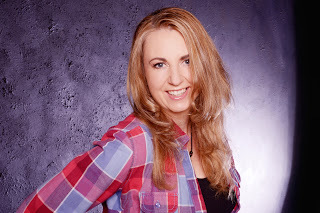 Steph Broadribb is an alumni of the MA Creative Writing at City University London, and trained as a bounty hunter in California. Her working life has been spent between the UK and USA. As her alter ego – Crime ThrillerGirl – she blogs about all things crime fiction at www.crimethrillergirl.com. Her debut novel – the action thriller DEEP DOWN DEAD – is published by Orenda Books.
Steph Broadribb is an alumni of the MA Creative Writing at City University London, and trained as a bounty hunter in California. Her working life has been spent between the UK and USA. As her alter ego – Crime ThrillerGirl – she blogs about all things crime fiction at www.crimethrillergirl.com. Her debut novel – the action thriller DEEP DOWN DEAD – is published by Orenda Books.
To learn more about Steph and buy her book visit the links below.
Twitter @CrimeThrillGirlFacebook https://www.facebook.com/CrimeThrillerGirl/ Instagram CrimeThrillerGirl Deep Down Dead on Amazon.com
THE INTERVIEW
You actually trained as a bounty hunter in California, and now your debut novel launches a series about a bounty hunter. How much are you and your protagonist similar? How do you differ?
Well, I trained as a bounty hunter but my protagonist, Lori Anderson, is the real deal. She’s a single mom and bounty hunter, and has been earning her living from the business for ten years. She’s determined and positive – which I’d say I am, and she’ll do anything for those she loves – again something I’d say we share. But she’s definitely a braver person than me, she takes on the bad guys – often more than one at a time – and has to be smart and super effective to stay alive, I don’t think I could kick ass the way she does! (Lori is totally kick-ass!)
Tell us about your path to getting your debut novel published:
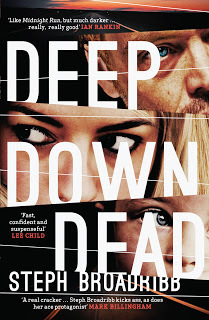 It all happened for me after I’d done the MA in Creative Writing (Crime Fiction) at City University London. Up until that point I’d been writing short stories and had a go at writing a novel, but by doing the MA I was able to totally immerse myself in the crime genre and get weekly feedback on my writing both from tutors and fellow students – it taught me to take critique and learn what worked well and less well as I developed my narrative and characters.
It all happened for me after I’d done the MA in Creative Writing (Crime Fiction) at City University London. Up until that point I’d been writing short stories and had a go at writing a novel, but by doing the MA I was able to totally immerse myself in the crime genre and get weekly feedback on my writing both from tutors and fellow students – it taught me to take critique and learn what worked well and less well as I developed my narrative and characters.
At the same time I got out and about to crime fiction festivals and conventions – CrimeFest, Theakston Old Peculiar Crime Festival, Bouchercon, and more – and starting meeting crime writers, agents and publishers. I was reading loads, and blogging as Crime Thriller Girl too.
I actually met my publisher – Karen Sullivan of OrendaBooks – at the Bloody Scotland Crime Writing Festival. I was pitching Deep Down Dead at the live pitching event, and she was there with her authors. We got chatting in the bar and she said to send her the book. It wasn’t until quite a while later, when I’d got my manuscript as polished as I could, that I sent it. But when I did Karen loved it, and her second reader – editor West Camel – loved it too. So I signed the contract with Orenda Books direct. Karen is an amazing publisher, her energy and enthusiasm for the books she publishes are limitless, and the whole experience of taking the book through the editing process, cover design, launching, and now going out on the festival circuit has been brilliant.
You've lived back and forth between the US and the UK. You chose to set your Lori Anderson series in the US (Florida, Georgia ...). Why did you make that choice? How did it impact your approach to the character and the series?
I’m a huge fan of the action thriller genre and so I knew I wanted to write an action thriller and I wanted to have a female lead. The US is a great backdrop for a thriller – each state has its own personality, and the geography is varied and the scope to move across vast distance is huge. In the UK we’re much more constricted on space so the lure of setting a novel in the US was strong.
I got the idea for Lori Anderson as a character when I was driving from the mountains of West Virginia into rural Virginia - inspired by the discovery that the taillights on my hire car weren't working and finding out that the nearest place I could get them fixed was over a hundred miles away! I stayed overnight in a rundown motel and from then on only drove in daylight.
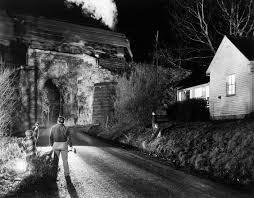 But it got me thinking - what if you had to keep driving and your taillights were out? And what if you got pulled over by a State Trooper because of it? And what if when they leaned into the car to take your license they heard banging in the trunk from the person you'd put in there? It started me thinking about the sort of person who might travel with a person in their trunk and why - and that's how Lori Anderson came about! It was really important to me that she was independent and solved her own problems, but had vulnerabilities too. Lori’s a modern woman – she’s got her own career, and works hard at being a good mom – but there’s a tension between the two, and she finds herself pulled in opposing directions. (I think you do a great job showing us that tension)
But it got me thinking - what if you had to keep driving and your taillights were out? And what if you got pulled over by a State Trooper because of it? And what if when they leaned into the car to take your license they heard banging in the trunk from the person you'd put in there? It started me thinking about the sort of person who might travel with a person in their trunk and why - and that's how Lori Anderson came about! It was really important to me that she was independent and solved her own problems, but had vulnerabilities too. Lori’s a modern woman – she’s got her own career, and works hard at being a good mom – but there’s a tension between the two, and she finds herself pulled in opposing directions. (I think you do a great job showing us that tension)
You also write under the name Stephanie Marland, with the first novel under that name launching later this year in ebook and in paperback next year. How do you juggle writing multiple books under multiple names with two different publishers? How different are your experiences with the different publishers?
Well, I don’t sleep very much! But seriously, in terms of juggling multiple books it’s been really important to have set deadlines for each so that I can plan out my writing year and everything gets delivered on time. I also work full time at a University, so I have to juggle the day job with the writing too. (Okay, I’m feeling a little wimpy in comparison right now…)
I’m really lucky that my fabulous agent, Oli Munson of AM Heath, London, and both my brilliant editors – Karen Sullivan (Orenda Books) and Sam Eades (Trapeze) – work together on the sequence of publication to make sure there are no date clashes and so the deadlines fall easily from that. I write everyday of the year, and keep a running tally of words so I know if I’m on track.
My experience with both publishers has been amazing, and I’ve loved the editing process – getting the opportunity to work with these talented and passionate editors really is a gift, and it’s helped craft and polish the books in a way it’s hard to do when it’s just you as a writer. I count myself very lucky.
You are interested in mystery, thriller, and true crime. What drives your interest in those genres? What got you started reading and writing in the crime thriller world?
I love the mystery of a crime thriller – the questions posed, and the nail-biting suspense until they are answered. It’s a story telling narrative that lets me fully immerse into it; I want to puzzle out who did it, or why they did it, or what will happen next.
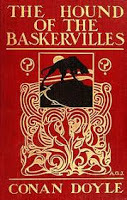 The first proper crime novel I read was Sherlock Holmes in Hound of the Baskervilles. I was eight years old and it terrified me and captivated me – and I adored it! I’ve been a crime thriller fan ever since, and am a huge fan of Lee Child, Mark Billingham, Ian Rankin, Jeff Abbott, Sue Grafton, Zoe Sharp and many others. (Now if I can only get you to add Elena Hartwell to your list …)
The first proper crime novel I read was Sherlock Holmes in Hound of the Baskervilles. I was eight years old and it terrified me and captivated me – and I adored it! I’ve been a crime thriller fan ever since, and am a huge fan of Lee Child, Mark Billingham, Ian Rankin, Jeff Abbott, Sue Grafton, Zoe Sharp and many others. (Now if I can only get you to add Elena Hartwell to your list …)
What are you working on now?
I’m currently working on the second book in the Lori Anderson series – DEEP BLUE TROUBLE – which will be out later this year in ebook and early 2018 in paperback.
Final Words of Wisdom:
Keep writing. Get feedback on your work. Learn and be determined. Never give up!SaveSaveSaveSave
 Steph Broadribb is an alumni of the MA Creative Writing at City University London, and trained as a bounty hunter in California. Her working life has been spent between the UK and USA. As her alter ego – Crime ThrillerGirl – she blogs about all things crime fiction at www.crimethrillergirl.com. Her debut novel – the action thriller DEEP DOWN DEAD – is published by Orenda Books.
Steph Broadribb is an alumni of the MA Creative Writing at City University London, and trained as a bounty hunter in California. Her working life has been spent between the UK and USA. As her alter ego – Crime ThrillerGirl – she blogs about all things crime fiction at www.crimethrillergirl.com. Her debut novel – the action thriller DEEP DOWN DEAD – is published by Orenda Books.To learn more about Steph and buy her book visit the links below.
Twitter @CrimeThrillGirlFacebook https://www.facebook.com/CrimeThrillerGirl/ Instagram CrimeThrillerGirl Deep Down Dead on Amazon.com
THE INTERVIEW
You actually trained as a bounty hunter in California, and now your debut novel launches a series about a bounty hunter. How much are you and your protagonist similar? How do you differ?
Well, I trained as a bounty hunter but my protagonist, Lori Anderson, is the real deal. She’s a single mom and bounty hunter, and has been earning her living from the business for ten years. She’s determined and positive – which I’d say I am, and she’ll do anything for those she loves – again something I’d say we share. But she’s definitely a braver person than me, she takes on the bad guys – often more than one at a time – and has to be smart and super effective to stay alive, I don’t think I could kick ass the way she does! (Lori is totally kick-ass!)
Tell us about your path to getting your debut novel published:
 It all happened for me after I’d done the MA in Creative Writing (Crime Fiction) at City University London. Up until that point I’d been writing short stories and had a go at writing a novel, but by doing the MA I was able to totally immerse myself in the crime genre and get weekly feedback on my writing both from tutors and fellow students – it taught me to take critique and learn what worked well and less well as I developed my narrative and characters.
It all happened for me after I’d done the MA in Creative Writing (Crime Fiction) at City University London. Up until that point I’d been writing short stories and had a go at writing a novel, but by doing the MA I was able to totally immerse myself in the crime genre and get weekly feedback on my writing both from tutors and fellow students – it taught me to take critique and learn what worked well and less well as I developed my narrative and characters. At the same time I got out and about to crime fiction festivals and conventions – CrimeFest, Theakston Old Peculiar Crime Festival, Bouchercon, and more – and starting meeting crime writers, agents and publishers. I was reading loads, and blogging as Crime Thriller Girl too.
I actually met my publisher – Karen Sullivan of OrendaBooks – at the Bloody Scotland Crime Writing Festival. I was pitching Deep Down Dead at the live pitching event, and she was there with her authors. We got chatting in the bar and she said to send her the book. It wasn’t until quite a while later, when I’d got my manuscript as polished as I could, that I sent it. But when I did Karen loved it, and her second reader – editor West Camel – loved it too. So I signed the contract with Orenda Books direct. Karen is an amazing publisher, her energy and enthusiasm for the books she publishes are limitless, and the whole experience of taking the book through the editing process, cover design, launching, and now going out on the festival circuit has been brilliant.
You've lived back and forth between the US and the UK. You chose to set your Lori Anderson series in the US (Florida, Georgia ...). Why did you make that choice? How did it impact your approach to the character and the series?
I’m a huge fan of the action thriller genre and so I knew I wanted to write an action thriller and I wanted to have a female lead. The US is a great backdrop for a thriller – each state has its own personality, and the geography is varied and the scope to move across vast distance is huge. In the UK we’re much more constricted on space so the lure of setting a novel in the US was strong.
I got the idea for Lori Anderson as a character when I was driving from the mountains of West Virginia into rural Virginia - inspired by the discovery that the taillights on my hire car weren't working and finding out that the nearest place I could get them fixed was over a hundred miles away! I stayed overnight in a rundown motel and from then on only drove in daylight.
 But it got me thinking - what if you had to keep driving and your taillights were out? And what if you got pulled over by a State Trooper because of it? And what if when they leaned into the car to take your license they heard banging in the trunk from the person you'd put in there? It started me thinking about the sort of person who might travel with a person in their trunk and why - and that's how Lori Anderson came about! It was really important to me that she was independent and solved her own problems, but had vulnerabilities too. Lori’s a modern woman – she’s got her own career, and works hard at being a good mom – but there’s a tension between the two, and she finds herself pulled in opposing directions. (I think you do a great job showing us that tension)
But it got me thinking - what if you had to keep driving and your taillights were out? And what if you got pulled over by a State Trooper because of it? And what if when they leaned into the car to take your license they heard banging in the trunk from the person you'd put in there? It started me thinking about the sort of person who might travel with a person in their trunk and why - and that's how Lori Anderson came about! It was really important to me that she was independent and solved her own problems, but had vulnerabilities too. Lori’s a modern woman – she’s got her own career, and works hard at being a good mom – but there’s a tension between the two, and she finds herself pulled in opposing directions. (I think you do a great job showing us that tension)You also write under the name Stephanie Marland, with the first novel under that name launching later this year in ebook and in paperback next year. How do you juggle writing multiple books under multiple names with two different publishers? How different are your experiences with the different publishers?
Well, I don’t sleep very much! But seriously, in terms of juggling multiple books it’s been really important to have set deadlines for each so that I can plan out my writing year and everything gets delivered on time. I also work full time at a University, so I have to juggle the day job with the writing too. (Okay, I’m feeling a little wimpy in comparison right now…)
I’m really lucky that my fabulous agent, Oli Munson of AM Heath, London, and both my brilliant editors – Karen Sullivan (Orenda Books) and Sam Eades (Trapeze) – work together on the sequence of publication to make sure there are no date clashes and so the deadlines fall easily from that. I write everyday of the year, and keep a running tally of words so I know if I’m on track.
My experience with both publishers has been amazing, and I’ve loved the editing process – getting the opportunity to work with these talented and passionate editors really is a gift, and it’s helped craft and polish the books in a way it’s hard to do when it’s just you as a writer. I count myself very lucky.
You are interested in mystery, thriller, and true crime. What drives your interest in those genres? What got you started reading and writing in the crime thriller world?
I love the mystery of a crime thriller – the questions posed, and the nail-biting suspense until they are answered. It’s a story telling narrative that lets me fully immerse into it; I want to puzzle out who did it, or why they did it, or what will happen next.
 The first proper crime novel I read was Sherlock Holmes in Hound of the Baskervilles. I was eight years old and it terrified me and captivated me – and I adored it! I’ve been a crime thriller fan ever since, and am a huge fan of Lee Child, Mark Billingham, Ian Rankin, Jeff Abbott, Sue Grafton, Zoe Sharp and many others. (Now if I can only get you to add Elena Hartwell to your list …)
The first proper crime novel I read was Sherlock Holmes in Hound of the Baskervilles. I was eight years old and it terrified me and captivated me – and I adored it! I’ve been a crime thriller fan ever since, and am a huge fan of Lee Child, Mark Billingham, Ian Rankin, Jeff Abbott, Sue Grafton, Zoe Sharp and many others. (Now if I can only get you to add Elena Hartwell to your list …)What are you working on now?
I’m currently working on the second book in the Lori Anderson series – DEEP BLUE TROUBLE – which will be out later this year in ebook and early 2018 in paperback.
Final Words of Wisdom:
Keep writing. Get feedback on your work. Learn and be determined. Never give up!SaveSaveSaveSave
Published on April 30, 2017 00:00
April 23, 2017
Jacquelyn Benson chats about Playwriting, First Novels & Wine
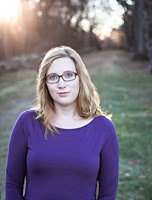 Jacquelyn Benson has always known who she wanted to be when she grew up: Indiana Jones. But since real archaeology involves far more cataloguing pot shards and digging through muck than diving out of airplanes and battling Nazis, she decided to devote herself to shamelessly making things up instead.
Jacquelyn Benson has always known who she wanted to be when she grew up: Indiana Jones. But since real archaeology involves far more cataloguing pot shards and digging through muck than diving out of airplanes and battling Nazis, she decided to devote herself to shamelessly making things up instead.
Jacquelyn studied anthropology in Belfast, Northern Ireland and married a man from Dublin, New Hampshire. She wrote a thesis on paranormal investigators and spent four years living in a museum. When not writing, you may find her turning flowers into wine, herding her unruly offspring, or hiding under a blanket devouring genre fiction. THESMOKE HUNTER is her first novel
You can learn more about Jacquelyn on social media, click on the links below:
Facebook Twitter Pinterest Instagram
THE INTERVIEW
You are now a novelist, but you also work as a playwright. How did you get involved with theater? And what made you jump (no pun intended) over to writing a novel?
Playwriting was really a lark for me. I went to a local theater for the first time in years, saw a fantastic original show and met the writer (the charming and talented G. Matthew Gaskell, now a dear friend). I had one of those, “Hell, I can do this” moments and dove in.
My approach has always been a little different – probably because before I started my first script, the only plays I’d ever read had been written by Bill Shakespeare. I write thrillers for the stage, for one thing, and as it turns out, those are rather rare birds. My shows all take place in real time. There are no scene changes, no breaks besides the intermission. I believe that the power of thriller as a genre on stage lies in grabbing that live audience and dragging them hell-for-leather through this incredibly intense experience. Stopping to jump around in time or change locations breaks that tension. I’m actually surprised that more thriller writers don’t play around on stage. It’s such a perfect venue for what we do. (Now I really want to see one of your plays!)
How did you end up living in a museum for four years? What was that like?
 The museum in question is the lovely Hamilton House, a historic building in South Berwick, Maine. The place is only open in summers for tours, and the rest of the year, caretakers who live in one of the outbuildings on the site look after the place. My husband and I got the gig from a friend and spent a few years there on the banks of the Salmon Falls river, making sure everything was holding up through the off-season and chasing away the occasional squirrel.
The museum in question is the lovely Hamilton House, a historic building in South Berwick, Maine. The place is only open in summers for tours, and the rest of the year, caretakers who live in one of the outbuildings on the site look after the place. My husband and I got the gig from a friend and spent a few years there on the banks of the Salmon Falls river, making sure everything was holding up through the off-season and chasing away the occasional squirrel. Your first novel, The Smoke Hunter, is a historical mystery, which starts in London and moves to Central America. What drew you to that time period and those places?
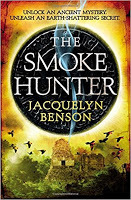 I love the late Victorian / Edwardian era. It’s a time of such transition in technology, morality, social structures, geopolitical balance…. You’re at the cusp of the modern world, the one we all recognize, but there was still so much unknown. There were empty spaces on those maps waiting to be filled in. Archaeology was more or less a new science, with all the mysteries of our past potentially at play. For women, too, it was a time of so much change and so many challenges.
I love the late Victorian / Edwardian era. It’s a time of such transition in technology, morality, social structures, geopolitical balance…. You’re at the cusp of the modern world, the one we all recognize, but there was still so much unknown. There were empty spaces on those maps waiting to be filled in. Archaeology was more or less a new science, with all the mysteries of our past potentially at play. For women, too, it was a time of so much change and so many challenges. As for London, I’m an unapologetic anglophile and absolutely love that city. British Honduras, on the other hand, was terra incognita for me. But it made sense as a location for the story I wanted to tell, and I quickly developed a fascination with it. I’ve never been, though, so a trip to Belize is definitely on the agenda at some point.
You went to school in Ireland. Did your time overseas have an impact on you as a writer?
 I studied Anthropology at Queen’s University of Belfast, and the anthropological mindset definitely informed my writing. It’s a discipline that teaches you an awareness of your own assumptions, biases—all the things you take for granted about the way the world works. Writing historical fiction is really an expedition into a different culture. You can’t just imprint your own experience onto the past.
I studied Anthropology at Queen’s University of Belfast, and the anthropological mindset definitely informed my writing. It’s a discipline that teaches you an awareness of your own assumptions, biases—all the things you take for granted about the way the world works. Writing historical fiction is really an expedition into a different culture. You can’t just imprint your own experience onto the past. Tell us about your writing process.
Ah, process! I’m a total nerd for it. I have a theory that “writer’s block” is actually a myth—that it’s really a symptom of applying the wrong process. Look, writers are all very different, and different things work for each of us when it comes to constructing a story. That means there are a lot of tools out there you can put into your toolbox. If you get stuck, it probably means you’ve got the wrong tool in your hand—one that you, personally, don’t jive with.
Writing The Smoke Hunter, as my first book, was as much about discovering my process as it was anything else. I started that story using the “flying by the seat of my pants” method and it was hell. I’ve since learned that I am a nitty-gritty, down-to-the-last-detail plotter. Even worse, I am a plotter who loves charts and systems and structures. When I approach constructing a story like an engineer would tackle designing a bridge, I never experience block. But for someone else, that method would be the death of inspiration.
So there’s my big piece of advice to writers: if you’re feeling stuck or stalled or frustrated, it’s probably time to approach your beast from a different angle. Get out there and do some reading about different techniques and start experimenting. You will absolutely know what’s right for you because suddenly the joy will come back into it again. (Great advice!)
What are you working on now?
Oh, I have a few things up my sleeve… dabbling in ancient Celtic religion, the Roman invasion of Britain, reading up on Akhenaten and the history of China… We’ll see what ends up getting the green light, and in the meantime I’ll keep making a mess in my sandbox.
Final words of wisdom
Writing a novel is an insane undertaking. It’s like juggling knives, flaming sticks and a live ferret all while balancing on a beach ball. If you let yourself think about everything you have to do in order to get to that final chapter, you’ll crawl under your desk and start sobbing.
So don’t. Make like Lao Tzu. Getting anywhere happens one little step at a time—and one step is easy, right? Break down writing that book into manageable pieces, whatever your process might be. Just write that next paragraph, or solve that problem in one little corner of your outline. If part of the endeavor is threatening to choke you, chop it up into even smaller bits. Then keep trucking through and one glorious day you’ll be able to step back from your keyboard with a goddamned novel shimmering on the screen.
And when that fails, there’s always wine.

Published on April 23, 2017 00:00
April 16, 2017
Debut Author Susan Alice Bickford Talks About the Inspiration for Her Novel
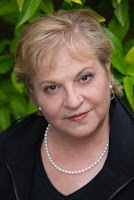 I'm so excited to host ITW Debut Author, Susan Alice Bickford this week as a guest blogger. Susan was born in Boston, Massachusetts, and grew up in Central New York.
I'm so excited to host ITW Debut Author, Susan Alice Bickford this week as a guest blogger. Susan was born in Boston, Massachusetts, and grew up in Central New York.
After she discovered computer graphics and animation her passion for technology pulled her to Silicon Valley, where she became an executive at a leading technology company.
She now works as an independent consultant, and continues to be fascinated by all things high tech. She splits her time between Silicon Valley and Vermont.
A Short Time to Die is her first novel.
To learn more about Susan, click on the links below.
Website Blog Facebook FacebookAuthorPage Twitter
A Compelling Event
On the last day of my freshman year of high school, two girls did not show up. This was a day of games and fun and we could wear shorts or anything we wanted. Why would George-Ann and Kathy skip school, this day of all days?
They were from a disadvantaged section of our school district, known for pockets of less pleasant behavior. The word was that they had run off to have fun—a euphemism for sex of course.
I wasn’t sure this fit. George-Ann and Kathy and I had snickered at the back of our homeroom class all year. We were friendly but not really friends. Still, this explanation didn’t ring true to me, particularly for Kathy, who was sweet and very young for her age. But it was summer and my concerns faded into as I took up vacation activities.
Two months later, their bodies were found, only a few steps from home. Spoiler alert: No one was ever charged with their brutal murders.
Many years later, I realized I needed to address a deep ache those murders had etched into my heart. I needed to write about a young woman who is faced with mortal danger and manages to escape. Thus the inciting event in chapter one of A Short Time to Die, my debut novel, was born.
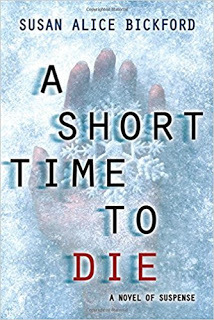 Great! I knew I had a compelling beginning. Now what? For the next year, I dug deeper into the awakening those murders had triggered when I was fourteen. Fortunately, I came from a wonderful, happy and supportive family, but that was when I began to see what it meant (and still means) to be young and vulnerable, particularly for girls and young women.
Great! I knew I had a compelling beginning. Now what? For the next year, I dug deeper into the awakening those murders had triggered when I was fourteen. Fortunately, I came from a wonderful, happy and supportive family, but that was when I began to see what it meant (and still means) to be young and vulnerable, particularly for girls and young women.In short: there are a lot of creeps in this world and there is a side of human nature that compels some to look for victims. Happily, there is also an empathetic side of human nature that compels many to reach out and help. Where these two facets of humanity intersect sits the heart of the story I chose to tell.
A Short Time to Dieis not the story of George-Ann and Kathy. Marly and her friend Elaine share some characteristics, but this is a different tale, inspired by my former classmates.
Writing A Short Time to Die became an almost magical experience, releasing many complex feelings and intertwined perceptions. When I tried to describe them, they seemed prosaic and ho hum. However, when I decided to show them embodied into elements of my story, I found deeply rewarding journey.
Published on April 16, 2017 00:00
April 9, 2017
Sheena Kamal Talks about First Novels, Writing for TV and Film, and Writing Daily
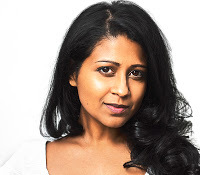 This week we get to visit with ITW Debut Author Sheena Kamal. Sheena was born in the Caribbean and immigrated to Canada as a child. She holds an HBA in political science from the University of Toronto, and was awarded a TD Canada Trust scholarship for community leadership and activism around the issue of homelessness. Kamal has also worked as a crime and investigative journalism researcher for the film and television industry— academic knowledge and experience that inspired this debut novel. She lives in Vancouver, Canada. Eyes Like Mine (and The Lost Ones) is her first novel. Read below to find out how that works with two books!
This week we get to visit with ITW Debut Author Sheena Kamal. Sheena was born in the Caribbean and immigrated to Canada as a child. She holds an HBA in political science from the University of Toronto, and was awarded a TD Canada Trust scholarship for community leadership and activism around the issue of homelessness. Kamal has also worked as a crime and investigative journalism researcher for the film and television industry— academic knowledge and experience that inspired this debut novel. She lives in Vancouver, Canada. Eyes Like Mine (and The Lost Ones) is her first novel. Read below to find out how that works with two books!
THE INTERVIEW
You have worked as a crime and investigative journalism researcher for film and television. What did that entail?I did information searches and wrote briefs for the producers of a crime drama series. It sounds quite dry but there was quite a bit of creativity involved because my research questions had to do with moving a narrative element of the show forward. In a way, it taught me how to do research for my own writing. It's very easy to get bogged down in the minutia but the pacing of television doesn't allow for lingering. So you get the information, plug it in and move forward. It's about what serves the story. I've found this to be a very valuable tool in my own writing. (Research can be so important for fiction writers and it's hard not to include every interesting detail -- this is great advice about not lingering!)
How long did it take you to write Eyes Like Mine? Was it your first novel? Or the first novel you had published?
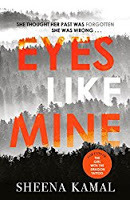 Eyes Like Mine is my first novel and, after moving to Vancouver to work on the book, it took me about eight months to get a solid draft on the page. It went through a few edits after that, but I was possessed by a certain kind of urgency initially so the story seemed to come along in a very short period of time.
Eyes Like Mine is my first novel and, after moving to Vancouver to work on the book, it took me about eight months to get a solid draft on the page. It went through a few edits after that, but I was possessed by a certain kind of urgency initially so the story seemed to come along in a very short period of time. Tell us about your writing process:I write in the mornings, edit or research in the afternoon and read for pleasure in the evening. I curse at my screen throughout the day, doesn't matter what time.
You have two books out in one year, Eyes Like Mine, your debut novel, and The Lost Ones, which comes out July 25. What was it like to go from unpublished, to published novelist with two titles under your belt?
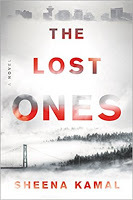 It's like cheating, seeing as how it's really just one book. One thing I didn't know going into this process is how drastically the title of your book can change. My U.K. publisher (Bonnier Zaffre) loved the title Eyes Like Mine and my U.S. publisher (William Morrow) loved The Lost Ones. I'm fond of both titles, but neither of was what the manuscript was called originally. I was unable to convince either side to change their minds, so I've got the two! But it has been an interesting experience, seeing how the same book is presented and marketed in two vastly different ways. (I'm glad to say I'm not the only who has made that mistake. I'm curious if anyone has a preference on the name - I love them both, though Eyes Like Mine may suit the story better)
It's like cheating, seeing as how it's really just one book. One thing I didn't know going into this process is how drastically the title of your book can change. My U.K. publisher (Bonnier Zaffre) loved the title Eyes Like Mine and my U.S. publisher (William Morrow) loved The Lost Ones. I'm fond of both titles, but neither of was what the manuscript was called originally. I was unable to convince either side to change their minds, so I've got the two! But it has been an interesting experience, seeing how the same book is presented and marketed in two vastly different ways. (I'm glad to say I'm not the only who has made that mistake. I'm curious if anyone has a preference on the name - I love them both, though Eyes Like Mine may suit the story better)Born in the Caribbean and raised in Canada, how do you think your international background impacts you as a writer? (Love Vancouver. I live east of Seattle and I get up to that area once in awhile. Beautiful!)Next time you're in town, hit me up! (I will!)
I'm not sure how my international background impacts me as a writer-- that may require some serious self-reflection. The beautiful thing about writing fiction is that it really boils down to your imagination. Your imagination can cross borders that your physical body couldn't even get the visa for. My experiences have informed who I am as a person and that naturally bleeds into my writing, but at the end of the day, I'm like every writer out there. Staring at the page. Wanting the story to write itself so that I can take a nap.
What are you working on now?I'm working on edits for the second book of the series, tentatively titled All Falls Down, and I'm in the planning stages for book three. I also write short stories to keep me sharp, so I always have a few of those on the go.
[image error] Final Words of Wisdom: I've developed some very unhealthy habits over the years, but one that keeps coming back to haunt me is that I need to write every day. I must do it, or else I'm unhappy. It has helped me career-wise, though, because no matter where I am in the world, in my life, in my head-- I write. Something. Sometimes not even even fiction. Being a debut can be scary at times, but this is how I hold my head up as a writer.
Published on April 09, 2017 06:54

